A Personal Journey: Breaking the Silence on FGM
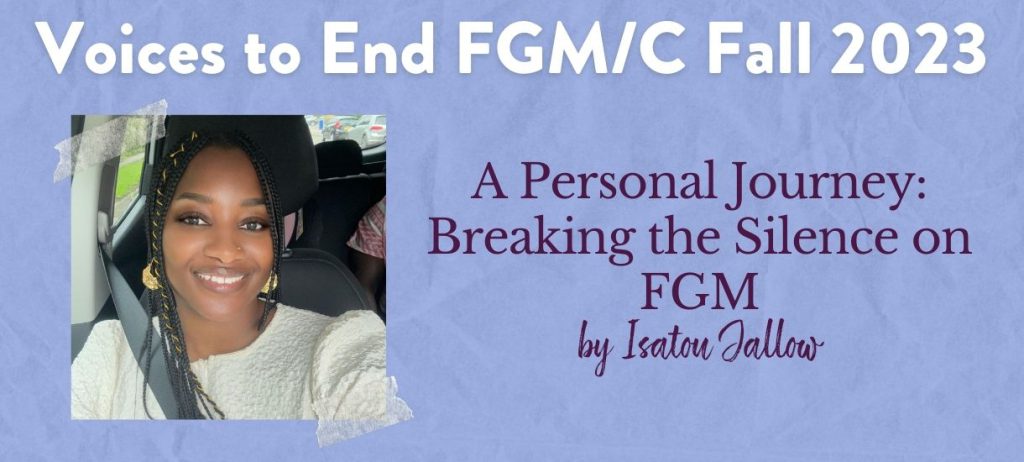
By Isatou Jallow In my film “Behind The Wall,” I’ve chosen to share my deeply personal experience with Type 3 Female Genital Mutilation (FGM). Through this storytelling, my aim is threefold. First, I want to educate. FGM, deeply rooted in tradition, often goes unquestioned. By unveiling the raw pain and suffering I endured, I hope to provoke reflection within communities about the necessity and ethics of this practice. Secondly, it serves as a testament to resilience. By sharing my story, I aim to show survivors that they are not alone and that healing is possible. It’s my hope that this personal account can offer solace and encouragement to those who have experienced similar pain. Lastly, this documentary is a call to action. By shedding light on FGM, we can mobilize governments, NGOs, and communities to work together to eradicate this harmful practice. In sharing my story, I hope to create a world where girls are free from this brutality, where silence is replaced with compassion, and where stories like mine inspire change. Together, we can amplify the voices of survivors and put an end to FGM. [youtube url=”https://www.youtube.com/watch?v=Nnf6zYEzjv4″] Isatou Jallow is a legal scholar in the final year of her Ph.D. program at the University of Washington School of Law. With a strong commitment to advocacy and community service, she has volunteered and interned at organizations like Northwest Immigrants Rights and YWCA Sexual Violence Legal Services. Isatou also served as a commissioner for the City of Seattle Immigrant and Refugee Services, fostering inclusion and understanding among diverse communities. She gained valuable experience in the HR department of Seattle Children’s Hospital, focusing on accommodation and worker’s compensation. Driven by a belief in diversity and inclusion, Isatou founded Inclusive Outlook, a nonprofit advocating for inclusive education for children with disabilities and the health rights of women with disabilities. She is also the founder of Amosa Skin, a brand donating most of its proceeds to support Inclusive Outlook’s initiatives. As Isatou approaches the final year of her Ph.D. program, she is focused on defending her research and completing her doctoral studies, aiming to contribute to research, policy development, and community engagement to promote inclusivity and make a positive impact.
Breaking the Cycle: A Journey in Women’s Health and FGM/C Awareness
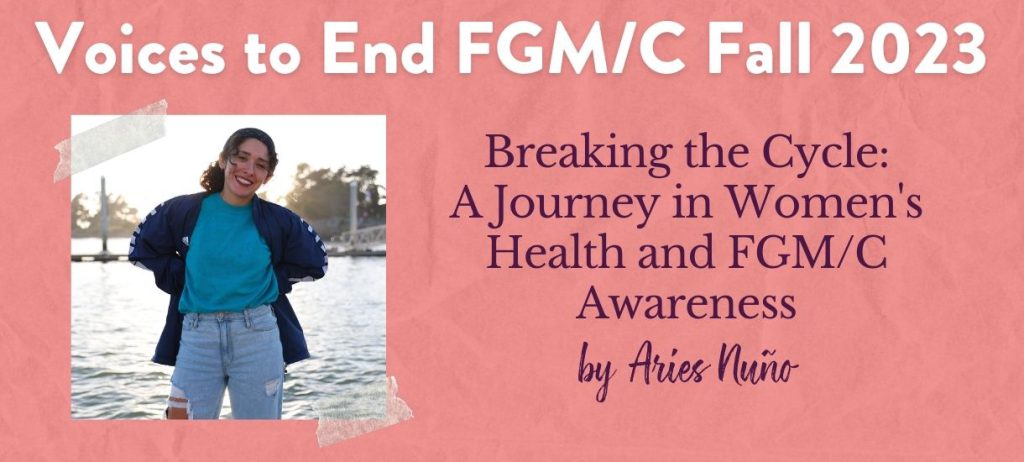
By Aries Nuño In participating in Sahiyo’s Voices to End FGM/C digital storytelling workshop, I chose to share a story that examined my journey toward understanding women’s health. This journey was not just a personal quest, but a response to a disquieting cultural reality: the pervasive silence among generations of women about their own bodies. Such silence, I discovered, often culminates in uncomfortable encounters within healthcare settings. My narrative serves as both a reflection and a critique of this phenomenon, extending its scope to spotlight the unique challenges faced by those who have undergone FGM/C when interacting with healthcare systems. I hope my story serves as an eye-opener for healthcare professionals and the general public. Healthcare providers should strive for empathy and cultural sensitivity, as well as an understanding of how negative interactions in a healthcare setting can exacerbate an already traumatic experience for survivors of FGM/C. For the public, I would like my narrative to be both an invitation to engage in an open dialogue about women’s health and an encouragement for conversations across generations — from grandmothers to mothers to daughters. By weaving these elements of storytelling together, I aim to not only bring individual experiences into a larger discussion, but also to contribute to a more nuanced, empathetic, and effective approach to public health. In doing so, I hope to be a part of breaking the cycle of silence and to help initiate lasting social change, one story at a time. [youtube url=”https://www.youtube.com/watch?v=QQbNhFlw4L8″] Aries Nuño is a public health professional interested in the sociocultural influences on an individual’s experience with sexual and reproductive healthcare. In her diverse public health career, she has contributed to projects including human-centered design to address female genital mutilation/cutting (FGM/C) in Ebonyi, Nigeria, and expanding web-based access to self-administered STI and HIV testing for Indigenous populations across the U.S. She began volunteering with Sahiyo in 2021, and now joins the team as the Training and Technical Assistance Coordinator. She looks forward to leveraging her public health background to facilitate educational opportunities to promote more sustainable approaches to end FGM/C.
Bearing Tradition: Navigating the Pressure of Khatna
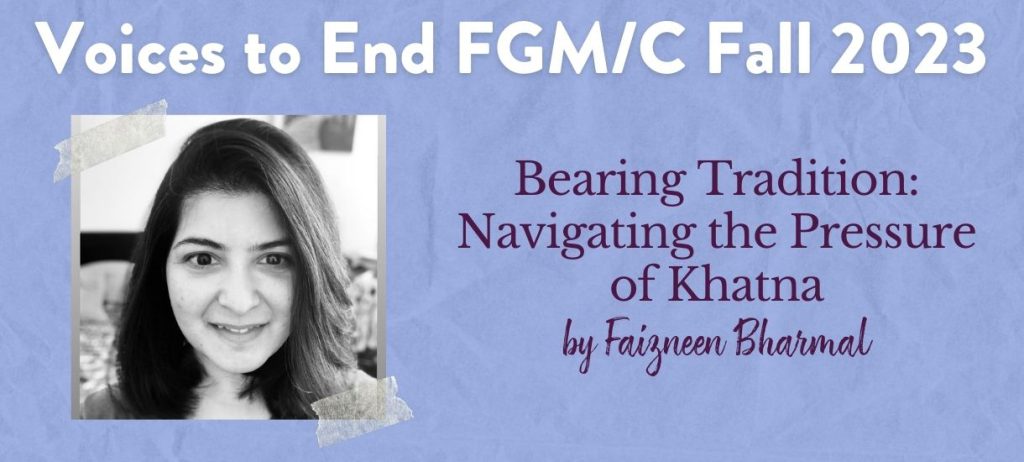
By Faizneen Bharmal Growing up in a progressive and well-educated Dawoodi Bohra family, the topic of Khatna, commonly known as female genital mutilation/cutting (FGM/C) around the world, was always shrouded in silence. The subject was rarely broached unless one became a parent, at which point it became relevant. For the majority of my life, I remained oblivious to its existence. Within the Dawoodi Bohra community, FGM/C Type 1 is predominantly practiced. In the majority of cases, this involves part of the prepuce or the clitoral hood being cut. I’ve often heard rationalizations for the practice, from women in my community: “We only remove a tiny, inconsequential part. Most girls hardly even notice it.” “It’s done under the supervision of a medical practitioner, ensuring hygiene and safety.” However, my story and experience prompts me to pose some critical questions to those who persist in this harmful practice. Does the severity of trauma a child endures become acceptable just because it involves removing a tiny part? A child who can remember when the act was performed on them? Are you so resolute in your beliefs that you’re willing to deprive your child of what they rightfully deserve? Does your religious duty and the societal pressure of community membership outweigh the lifelong trauma that a child must endure? For far too long, Khatna, as it’s referred to in the Bohra community, remained a closely guarded secret—a taboo subject that was never up for discussion. What perplexes me is that it contradicts everything I know about my community: A community that prides itself on being educated, forward-thinking, and modern. My story isn’t merely about the personal trauma I endured, but also about the immense pressure the community exerts on each generation to uphold this tradition. A tradition, it seems, is a beast that’s not easily slain, even if it causes them to sacrifice the well-being of young girls. When I made the decision to share my story, I engaged in a profound conversation with my mother. I’m grateful that she understood my perspective and is willing to support me in my mission to educate women of her generation and those younger so that the burden of this practice is not passed down to their daughters and daughters-in-law. [youtube url=”https://www.youtube.com/watch?v=a8rNekCvjc4″] Faizneen is a communications professional with 12+ years of experience working to inspire action and meaningful engagement via content creation, storytelling, and media in humanitarian crises situations, rural transformation, public health, human rights, women’s rights, literacy, and poverty alleviation.
You mean it’s not supposed to hurt when I pee?

Why did you want to attend the workshop and share your story? I wanted to attend this workshop because I wanted to get a sense of the process of storytelling from a survivor’s and advocate’s perspective. I am keeping in my heart hundreds of stories that survivors from my community have shared with me. What story did you choose to tell and create into a digital story? I chose to tell the story of medical complications caused by FGM/C and the cry for help from hundreds of women who shared their stories with me. What have you learned or most enjoyed during the workshop and by meeting others who shared their stories? The camaraderie and the shared lived experiences cannot be replicated. It was a once-in-a-lifetime experience that was divinely orchestrated with the right mix of participants present. What kind of impact would you like your story to have? I hope that my story will be a clarion call for folks to help me bring to light the need for medical care for hundreds of thousands of women who need help locally, nationally, and globally. Is there anything in your digital story that you would like to share? My digital story connects trauma, healing, and resilience to drawing strength from our ancestors. Our healing journey is incomplete without acknowledging their pain and their untold stories. [youtube url=”https://www.youtube.com/watch?v=IVlRd4yz9Yg”] Doris Mukangu, MPH, is the Founder and Executive Director of the Amani Women Center, a comprehensive culturally tailored community center that provides comprehensive services that empower and contribute to the economic security and well-being of refugee and immigrant women and their families. As a graduate of Emory University, Rollins School of Public Health, and Harvard Kennedy School of Non-Profit Management, Mukangu has over eighteen years of experience serving in leadership roles with non-profit organizations on refugee affairs and health promotion and education. Mukangu has served as a technical expert on programs initiating and implementing culturally appropriate, trauma-informed equitable methods of training, program planning, evaluation, and dissemination. With a strong commitment to prompting wellbeing, advocacy, and empowerment to the most vulnerable populations, Mukangu founded Johari Africa; a women’s economic empowerment program, served as vice president of the board of Tapestri Inc, ending violence and oppression in refugee and immigrant communities, and serves on the steering committee of US End FGM/C Network https://endfgmnetwork.org/.
I Didn’t Dare Ask
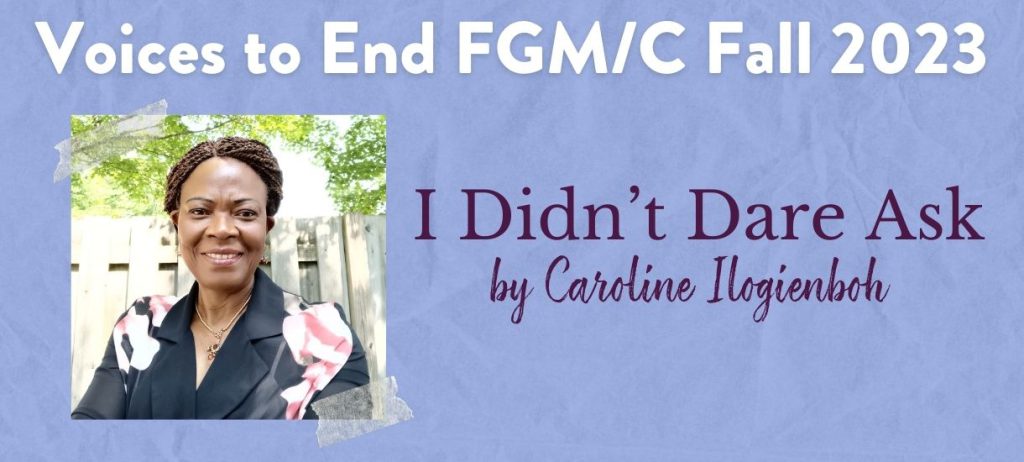
Why did you want to attend the workshop and share your story? I attended the workshop to learn about digital storytelling as another medium of communication in my advocacy work to stop female genital mutilation/cutting (FGM/C). What story did you choose to tell and create into a digital story? I shared the story of the unintended consequences of my cut. After the procedure, I was victimized in school. My peers mocked, despised, and isolated me; I was a loner thereafter. I lost my essence in an age when most youth are filled with exploratory exuberance. What have you learned or most enjoyed during the workshop and by meeting others who shared their stories? Hearing stories from others was an eye-opener. At the workshop, I became more aware that FGM/C can be like secondhand smoking: the procedure can affect those who themselves did not undergo the surgery. I found out that the ripple effect can be as devastating as the cut. Meeting others at the workshop made me feel a kinship with those affected directly or indirectly. Our experiences left us with a long-lasting bond. What kind of impact would you like your story to have? When one part of the body suffers, the whole body suffers. I want people to know that FGM/C can damage an individual’s self-worth, which can become the root cause of other behavioral or mental health issues. Is there anything in your digital story that you would like to share? The story is a plea to practicing communities, to convince them that the cost of the practice, imposed on the society, far outweighs the traditional beliefs driving it. It is my hope that silence will be broken, and people will be motivated to engage in an intellectual conversation that could demystify this traditional belief, with an aim to abolish it. [youtube url=”https://www.youtube.com/watch?v=TbmLtZ6ep6g”] Pidgin version: [youtube url=”https://youtu.be/MG5ZwPGoVFw?si=3IPaMuclLNxcAPP8″] Nigerian-born Caroline Ilogienboh retired from the Justice System in New Jersey, USA. She has written several books. Her award-winning book, “Saving Bekyah” is focused on female circumcision and its effects on women and society. The sequel, “The Greatest Hijack,” is on the Author’s Favorite list. She is currently working on the last of the trilogy, “The Hijacker Strikes Back.” When she’s not writing, Caroline spends time gardening or with her grandchildren.
Reflecting on Sahiyo’s Voices Healing Circle
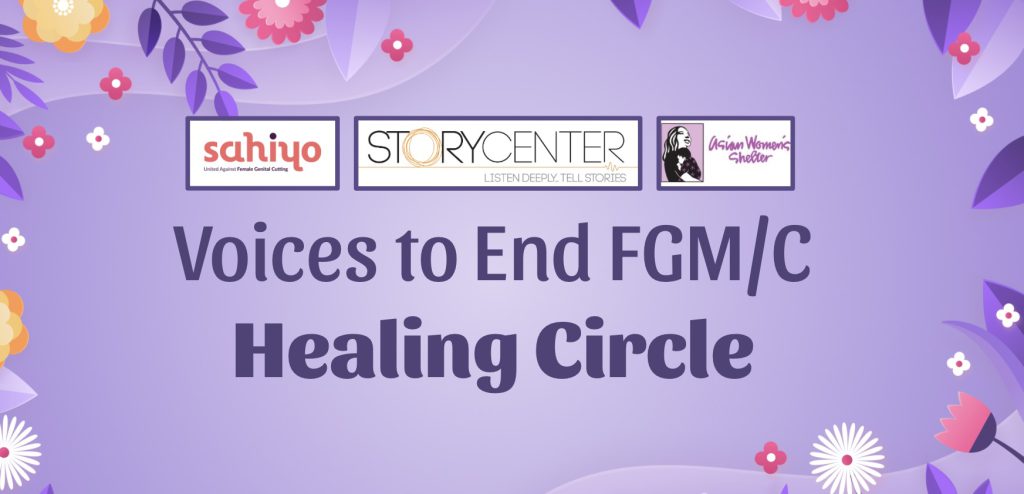
On December 18th, Sahiyo hosted a Voices Healing Circle where participants from across workshop cohorts came together to reconnect and meet new members of the Voices network. These sessions are part of Sahiyo’s ongoing support events for Voices alumni, serving to create a space for sharing experiences, fostering camaraderie, navigating the challenges, and celebrating the successes encountered post-release of their Voices to End FGM/C digital stories. This particular Healing Circle engaged Voices alumni who were open to sharing personal experiences from the release of their stories with the most recent Voices cohort. The Circle sparked discussions on the bravery in challenging barriers that make these conversations so difficult, as well as how opening up about female genital cutting (FGC) often means confronting not only personal trauma, but also societal expectations and norms. Alumni also reflected on experiences of receiving empathy from individuals not impacted by the practice, and how they were able to foster connections across diverse experiences. The overarching goal was to prepare participants of the August 2023 Voices cohort for the public debut of their narratives. Through open discussions, we can gain a deeper understanding of how to navigate the complexities and emotions that come with sharing personal experiences. We extend heartfelt gratitude to all participants of the Voices workshops over the years for their courage and resilience in sharing their stories with us and the world, and express our admiration for those taking steps towards breaking the silence and fostering understanding and change in their communities. Learn more about the Voices to End FGM/C program.
2024 begins with team transitions at Sahiyo
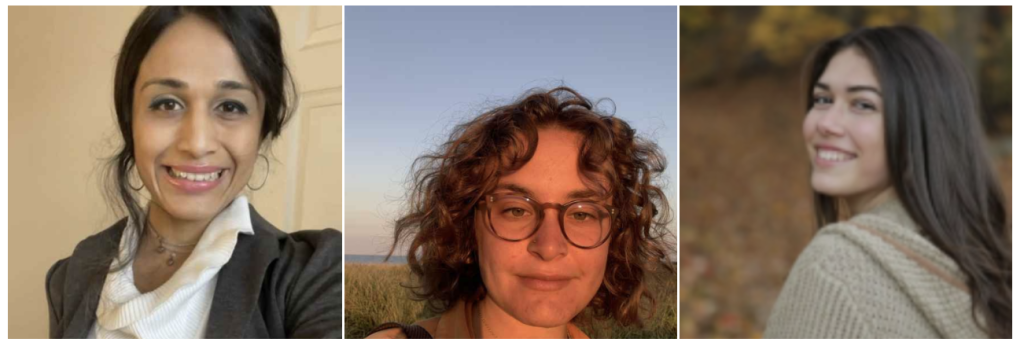
As we settle into 2024, the Sahiyo family is excited to welcome Sheena Vasani as our new Editorial Coordinator. Sheena, a strong believer in the power of the written world to enact social change and heal, has gone viral multiple times for her work on South Asian women’s rights and mental health issues. Rachel Wine, Sahiyo’s former Editorial Coordinator, will transition into the role of Research Coordinator. She is eager to lead the efforts in disseminating Sahiyo’s original research findings from the Critical Intersections project, and support partnerships with students and independent researchers. Lastly, we say farewell to Programs Associate Meg Sinnott, who after nearly two years supporting the efforts of Sahiyo’s policy work and various programs, transitioned off of the team last month. We wish her luck in all future endeavors!
